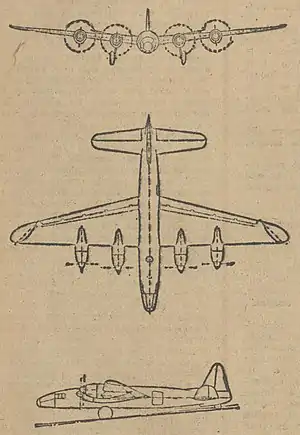SNCASE SE-1010
The SNCASE SE-1010 was a late 1940s French photo-survey aircraft designed and built by SNCASE for the Institut Géographique National, one prototype was built but it crashed and the project was cancelled.[1]
| SE-1010 | |
|---|---|
 | |
| 3-views of the SNCASE SE.1010 | |
| Role | Photo-survey aircraft |
| National origin | France |
| Manufacturer | SNCASE |
| First flight | 24 November 1948 |
| Retired | 1 October 1949 |
| Status | Destroyed |
| Number built | 1 |
Design and development
In 1945 SNCASE had designed a "stratospheric" transport for transatlantic postal work designated the SE-1000, it was not built but given a modified nose-section it was built as high-altitude photo-survey aircraft for the Institut Géographique National and designated the SE-1010.[1] If not used as a survey aircraft it was proposed to produce it as a 14-passenger transport.[1]
The SE-1010 was a sleek-looking, four-engined, mid-wing monoplane powered by four Gnome-Rhône 14R 14-cylinder two-row air-cooled radial engine. The prototype SE-1010, with French test registration F-WEEE, first flew on 24 November 1948.[1] On 1 October 1949 the prototype entered a flat-spin during test flying from Mariganne, it crashed killing the six crew near Carcès. The project was canceled and the three aircraft being built were not completed.[1]
Variants
- SE-1000
- Proposed four-engined stratospheric transatlantic postal aircraft, not built.[1]
- SE-1010
- High-altitude photo-survey aircraft, one built.[1]
- SE-1011
- Production aircraft: three under construction when project was abandoned.
- SE-1015
- Long-range 18 seater courier airliner'
- SE-1020
- Maritime patrol aircraft with Jumo 213 engines and gun turrets.
- SE-1030
- Proposed 40-passenger airliner variant, not built.[1]
- SE-1035
- Proposed airliner variant, not built.
- SE-1040
- Proposed turboprop test-bed to evaluate the Rolls-Royce Dart engine.
Specification (Survey aircraft)
Data from French Postwar Transport Aircraft,[1] Jane's all the World's Aircraft 1947[2]
General characteristics
- Crew: 4
- Capacity: 14 pax, 4 pax with freight hold, 8 pax with freight hold, or 0 pax with 26.5 m3 (940 cu ft) freight hold
- Length: 21.81 m (71 ft 7 in)
- Wingspan: 31 m (101 ft 8 in)
- Height: 5.2 m (17 ft 1 in)
- Wing area: 116.3 m2 (1,252 sq ft)
- Empty weight: 14,000 kg (30,865 lb)
- Gross weight: 25,000 kg (55,116 lb) -27,000 kg (60,000 lb) (photographic aircraft)
- Gross weight passenger version: 33,000 kg (73,000 lb)
- Fuel capacity: 16,040 l (4,240 US gal; 3,530 imp gal) fuel;380 l (100 US gal; 84 imp gal) oil
- Powerplant: 2 × Gnome-Rhône 14R-28 14-cylinder two-row air-cooled radial engine, 1,200 kW (1,600 hp) each for take-off; LH rotation fitted to starboard
- Powerplant: 2 × Gnome-Rhône 14R-29 14-cylinder two-row air-cooled radial engine, 1,200 kW (1,600 hp) each for take-off; RH rotation fitted to port
- Propellers: 3-bladed Ratier, 3.8 m (12 ft 6 in) diameter constant-speed propellers
Performance
- Maximum speed: 635 km/h (395 mph, 343 kn) at 8,000 m (26,000 ft)
- Cruise speed: 540 km/h (340 mph, 290 kn) at 8,000 m (26,000 ft)
- Range: 7,300 km (4,500 mi, 3,900 nmi) no headwind
- Time to altitude: 8,000 m (26,000 ft) in 36 minutes; 9,000 m (30,000 ft) in 46 minutes
- Wing loading: 283 kg/m2 (58 lb/sq ft) at 33,000 kg (73,000 lb)
- Power/mass: 6.84 kg/kW (11.3 lb/hp) at 33,000 kg (73,000 lb)
References
- Notes
- Chillon/Dubois/Wegg 1980, p.101
- Bridgman, Leonard, ed. (1947). Jane's all the World's Aircraft 1947. London: Sampson Low, Marston & Co. pp. 137c–138c.
- Bibliography
- Chillon, Jacques. Dubois, Jean-Pierre and Wegg, John. French Postwar Transport Aircraft, Air-Britain, 1980, ISBN 0-8513-0078-2.